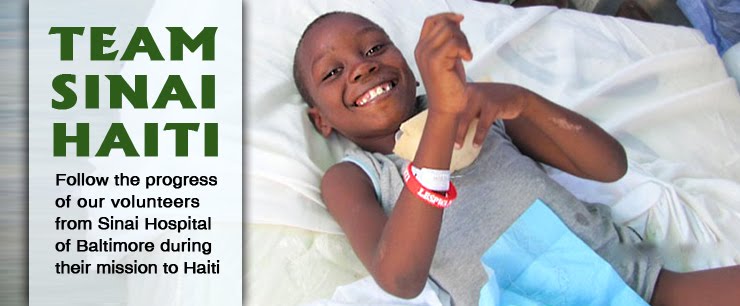Sinai Team Back From Haiti
Sinai team returns from earthquake-ravaged Haiti.
July 9, 2010Alyssa Jeffers
Editorial Intern
“We take for granted what we have here — food, clean drinking water, state-of-the-art medical equipment, even oxygen,” says Dr. Aaron Zuckerberg. “They don’t have any of that, and yet they don’t complain.”
Last January, a magnitude 7.0 earthquake rocked Haiti, a poor Caribbean country the size of Massachusetts. Approximately 230,000 people died, and there was widespread damage, particularly in the capital of Port-au-Prince.Since then, relief has poured in to Haiti from all over the world, including a recent volunteer group from Sinai Hospital of Baltimore.
Dr. Zuckerberg and Dr. John E. Herzenberg, along with 16 other Sinai-affiliated doctors and health care workers and volunteers, as well as some of their family members, traveled to Port-au-Prince to help take care of injuries sustained in the quake. They were there from June 11 to 17.
Getting to Haiti was not easy because of airline restrictions, according to participants. Not allowed to transport crates, extra bags and narcotics, they said the team worked around the clock to pack three bags per person — for food, clothing, and necessary gear and supplies.
Upon arrival in Port-au-Prince, they said they immediately saw tents lining the streets and roads covered in sewage. Trash removal was provided only by wild pigs roaming the areas, they said.
Dr. Herzenberg, head of pediatric orthopedic surgery at Sinai and director of the International Center for Limb Lengthening, said Haiti was “orders of magnitude worse” than what he has seen on 13 other relief missions. He said Haiti was “three levels worse” economically than prior to the disaster.
The Sinai team was based at Adventist Hospital in the capital. During 6 1/4 days, they performed 54 surgeries, on little to no sleep. Dr. Zuckerberg, a pediatric anesthesiologist/intensivist who is director of the pediatric intensive care unit at Sinai, performed anesthesia on 31 of the patients, while Haitian medical personnel anesthetized the rest.
“Normally, [anesthesiologists] get the day off after a late night, but not here,” said Dr. Herzenberg. “Aaron would work all day, get a few hours of sleep, and be up again bright and early the next morning. He personally saved the lives of two patients. He went above and beyond what he was trained to do and performed two very important surgeries. With any other anesthesiologist, those two
patients would have died.”
“Every mission I go on, there is one patient that sticks out in your mind,” said Dr. Herzenberg. “[Mia] had been struck by a car and broke her femur. Her leg from the knee down was completely dead. She had a fractured femur that was completely infected. She was very anemic, with her hemoglobin down at 3.5 [the normal rate is 15].”
The Sinai team operated on Mia four times. “She needed blood, but it was taking too long,” said Dr. Herzenberg. “My wife [registered nurse Merrill Chaus] donated her own blood in order to receive blood for Mia. During the transfusion, Mia began bleeding profusely. She had citrate poisoning, meaning her blood wouldn’t clot. That night we decided to operate, even though we had wished to do it the following morning.
“I was convinced she was going to die on the table,” he said. “Thankfully she didn’t, and we successfully amputated her leg. We took her back two days later to redress her and see how things were doing. There were bits of dead tissue we missed the first time, so we went in to clean them out. Suddenly, the femoral artery burst and was spewing everywhere. With the team working together, we saved her. The next morning, we went to check on her before we left, and she was sitting up brushing her teeth.”
Team members were particularly impressed by the Haitians support for each other. They said nearly every patient had at least one family member with them at all times, and if a patient did not have any relatives, a stranger would step in to help.
In addition, the team members said they were impressed by the Haitians’ commitment to their faith system and respect for other religions.
“The Haitian nurses and doctors pray before every operation and have a prayer service every morning,” said Dr. Zuckerberg, who was one of the shomer Shabbatteam members. “They tried incorporating Judaism into common practices, making it very workable. There was an understanding that life-saving operations fell under the umbrella of work allowed on the Sabbath.”
At the end of the trip, all of the team members were in tears. “We were all very touched by this,” said Dr. Zuckerberg. “We were all crying when we left. We all want to go back. The question isn’t if, it’s when.”
Check out the team’s blog at teamsinaihaiti.blogspot.com/.
Photo captions:
Sinai Hospital’s Dr. John E. Herzenberg chats with a Haitian patient.
Team Sinai’s Haitian-born Dr. Job Timeny gives a patient Mia, 8, a big squeeze.
The team’s John D. Logue examines an earthquake victim.
(photos provided)
Sinai Hospital’s Dr. John E. Herzenberg chats with a Haitian patient.
Team Sinai’s Haitian-born Dr. Job Timeny gives a patient Mia, 8, a big squeeze.
The team’s John D. Logue examines an earthquake victim.
(photos provided)

No comments:
Post a Comment